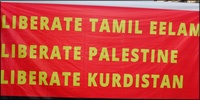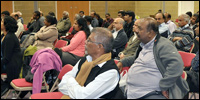|
|
17 matching reports found. [TamilNet, Friday, 01 May 2015, 12:08 GMT]“Only a new generation of organic Tamil intellectuals, who have a clear understanding of changing global paradigms and who are able to create paradigm shifts in Tamil political discourse, can preserve and take forward Sivaram’s legacy” writes research scholar RM Karthick. In an article written on the occasion of the 10th anniversary of the assassination of ‘Taraki’ Sivaram Dharmeratnam, Mr. Karthick argues that the current Tamil intelligentsia needs to live up to its historical responsibility in exposing the designs of the powers, be it in Oslo, Geneva or Singapore. Criticizing mainstream Tamil intellectuals for their apathy and for failing to keep up with important changes in South Asian geo-politics, he further says that “a nation’s ability to spring back to its feet politically depends on how soon it is able to organize itself intellectually.” Full story >> [TamilNet, Thursday, 30 April 2015, 10:29 GMT]The 10th death anniversary of assassination of Senior Editor at TamilNet, an Eezham Tamil intellectual, journalist, political analyst and activist Dharmeratnam Sivaram (Taraki) was marked on Tuesday in Chennai. Sivaram, beside his profound love for his people, was a genuine internationalist who dedicated his life and writing- to quote him in his own words, “…to create a body of knowledge to help oppressed people all over the world help themselves to get out from under oppression; to disseminate this body of knowledge.” A decade after his assassination by the hands of the Sri Lankan state, Eelam and much of the oppressed nations of the world which he espoused solidarity with and desired to aid are still beleaguered and subjected to counter-insurgency perpetuated by their respective oppressor states aided by world powers. Full story >> [TamilNet, Tuesday, 04 November 2014, 20:47 GMT]“The system that oppresses us is global. The system that oppresses us is united and in solidarity with each other. So we need to be in solidarity with each other against the same system that oppresses us. The Tamil national liberation struggle is a case in point. Your enemies are our enemies”, said Kurdish activist Memed Aksoy, urging for greater solidarity among oppressed nations. In an exclusive interview to TamilNet on Sunday, Mr. Aksoy, who is also a filmmaker and writer, talking about the current situation in Kobane, the nature of the ISIS and its supporters, the duplicity of Turkey, the PKK’s commitment to the peace process, and the changing policies of the West towards the Kurds, gave a concise picture of the Kurdish resistance and the local and global challenges it faces.
Full story >> [TamilNet, Saturday, 09 August 2014, 00:17 GMT] In a series of protests that happened across the globe, Tamils demonstrated their solidarity with the nations of Kurdistan and Palestine. Condemning the Islamist ISIS’ brutality and ethnic cleansing against the Kurds in the Kurdish territories of Syria and Iraq and Israel’s unrelenting assault on Palestine, Tamil activists conveyed their support for independent Kurdistan and Palestine. Over the past few weeks, protests for these causes in Chennai, London, Washington, Los Angeles, Sydney, Toronto and other places saw active Tamil participation. Over 2000 activists of different organizations staged a protest in Chennai on Friday for Kurdistan and Palestine. Likewise, Tamil activists who attended a Kurdish demonstration in London on Friday highlighted the need for greater solidarity among Nations-Without-States. Full story >> [TamilNet, Saturday, 07 June 2014, 23:48 GMT]In the context of the Tamil Eelam liberation struggle, when a “micronarrative” discourse about gender, caste, region or other “special interest groups” claims autonomous status, “when it divorces itself from the primary contradiction between the Tamil nationalist metanarrative and the Sri Lankan state, it only ends up fracturing a resistance movement against genocide” argues Karthick RM. In an article published on Indian journal Sanhati, providing examples of how such differences were used to fracture the Eezham Tamils liberation struggle in the past and the present, he shows that such “dissidence” only assists the logic of counterinsurgency (COIN). Drawing from classical and contemporary COIN experts and from the writings of psychologists, Mr. Karthick also observes how such micronarratives and a defeatist mentality complement each other. Full story >> [TamilNet, Saturday, 10 August 2013, 08:55 GMT]“If India opens dialogue with moderate groups, extremists will be isolated and India can influence diaspora people for solution within a united Sri Lanka," said V. Suryanarayan of the New Delhi think tank, cited by The Times of India on Friday. In July, writing in The New Indian Express, the same person said “In order to allay Sinhalese apprehensions, iron-clad guarantees should be provided that devolution to provinces should not lead to demand for separation.” The explicit and unashamed priority in the heart of the academic and the Mumbai-New Delhi-Chennai-based media corporates in India, is to only negate at any cost the possibility of Eezham Tamils getting independence than delivering even paltry political justice, commented Tamil activists for alternative politics in the island.
Full story >> [TamilNet, Sunday, 14 July 2013, 11:02 GMT]The abuse of Eezham Tamil women committed by the Sri Lankan state apparatus should not be seen as individual human rights violations but as a part and parcel of an intended genocide of a protracted nature, write Dr. N. Malathy, key member of NESoHR and author of ‘A Fleeting Moment in my Country’ and RM Karthick, research scholar at University of Essex, UK. In an article published on Indian journal Sanhati’s 6th issue for 2013, the authors, criticizing international organizations for their failure to properly deal with the issue of genocidal rape by Sri Lankan forces, also call on the Tamil community to have a change of social approach towards rape survivors, noting how violence against Tamil women is deeply intertwined with communal identity. Full story >> [TamilNet, Saturday, 09 February 2013, 17:33 GMT]Arguing that while the strategy for Tamils world over should be the restoration of Eezham Tamil sovereignty over their traditional homeland, RM Karthick writes that the Tamil diaspora organizations must arrive at a consensus for an immediate tactic to alleviate the mutilation of the Eezham Tamil nation in the Tamil homeland by the occupying Sinhala military via an interim solution of an intervention of international powers in the island to facilitate the dismantling of the Sinhala military apparatus. Contending that such an interim solution should not give any legitimacy whatsoever to the Sri Lankan constitution, the writer further argues that any interim solution can be successful only on an extra-constitutional basis that has pre-constitutional recognition of the Eezham Tamil nation’s territoriality and historical sovereignty. Full story >> [TamilNet, Monday, 14 January 2013, 02:01 GMT] Thousands of Kurds from across the UK took to the streets in London on Sunday condemning the recent assassination of three Kurdish women activists in Paris. Demanding a proper inquiry and immediate justice for the brutal murders of Sakine Cansiz, co-founder of the PKK, and activists Fidan Dogan and Leyla Soylemez, the protestors raised slogans of ‘”Turkey is a terrorist state” and “We want freedom”. Kurdish sources told TamilNet that the assassination was an attempt to sabotage the Kurds desire for peaceful negotiations and France should act soon, lest it portrays itself complicit by inaction. Large protests were also held in France and Germany on Saturday. These protests saw the participation of solidarity groups and Eezham Tamil activists, who had joined to convey their solidarity with the Kurds. Full story >> [TamilNet, Thursday, 11 October 2012, 18:26 GMT]After the International Community of Establishments working in tandem with a genocide-intending Sri Lankan state oversaw a brutal military solution over the armed struggle of the Eezham Tamils in May 2009, the ‘Sri Lanka model’ of dealing with insurgencies is now being incorporated into the science of Counterinsurgency (COIN), opines RM Karthick, observing what dangerous ramifications this could have for struggling peoples worldwide in an article published on Sanhati, an Indian online journal, on Wednesday. Outlining internal and external factors in shaping the conflict, using the politico-military analysis of the late TamilNet senior editor ‘Taraki’ Sivaram, the author explains how internationally coordinated measures against the LTTE and the genocidal intent of Sinhala nationalists led to Mu’l’livaaykkaal and the systemic repression of the Eezham Tamils in their homeland that followed. Full story >> [TamilNet, Tuesday, 02 October 2012, 23:44 GMT] Eric Hobsbawm, one of the most prominent British historians of this century and the last, passed away at the age of 95 at London this Monday. Hobsbawm, who specialized in the history of industrial revolution in the West and the emergence of modern societies in Europe, underscored in his works the crucial role that popular culture played in the evolution of history. Besides influential works on historical epochs in modernity and the study of history as a discipline, Hobsbawm has also written extensively on the subject of nations and nationalism. Till his death, despite his loss of faith in the Soviet/Chinese model of socialism, he remained convinced that the current model of capitalist globalization was against the interests of humanity, writes RM Karthick, research scholar at a British university. Full story >> [TamilNet, Monday, 18 June 2012, 06:43 GMT]After threatening the Eezham Tamils with annihilation with the genocidal massacre at Mu’l’livaaykkaal, unitary Sri Lanka’s idea of reconciliation and the best solution it can offer is assimilation “where the Eelam Tamils will lose all sense of identity and become ‘authentic Sri Lankans’ i.e. mimics of the Sinhalese,” writes RM Karthick, in an article published on JDSLanka . But even as the Sri Lanka implements its model of ‘reconciliation’ through land grabs, Sinhalisation and Buddhicisation, world establishments are compelling the Eezham Tamils in the homeland and diaspora to reconcile with this ‘change of ground realities’. Likewise, the concept of ‘restorative justice’, taken from South Africa being proposed by such establishments in a wrong context to the Eezham Tamils who bear the brunt of genocide will only facilitate eventual assimilation into unitary Sri Lanka. Full story >> [TamilNet, Friday, 11 May 2012, 02:41 GMT] Commemorating the life, thoughts and contributions of ‘Taraki’ Sivaram Dharmeratnam, and inviting diverse views on the same, the Sivaram Memorial Seminar conducted in London on Sunday brought together Tamil, Sinhala, Muslim, British and Tamil Nadu journalists, academics and activists to discuss the intellectual legacy of the late senior editor of TamilNet. Referring to personal interactions with Sivaram, his ideological influences, his life as journalist and activist, his political and strategic analysis, the speakers interacted with the audience that included members of different shades of diaspora organizations, mainstream media and solidarity groups. The tightly packed programme included a closed door screening of award winning film-maker Beate Arnestad’s documentary ‘Silenced Voices’ to the seminar attendees. Full story >> [TamilNet, Monday, 28 November 2011, 18:59 GMT]The Tamil Sovereignty Cognition declaration released this year on Heroes Day would serve as a ‘conceptual reference point’ in ensuring that Tamil sovereignty is never compromised, writes RM Karthick, research scholar at a British university, in an article published in Countercurrents, an Indian on-line journal. “It is naivety to expect anything democratic from a unitary state of Sri Lanka,” he argues drawing parallels between the observations by the military analyst and senior editor late Mr. Sivaram Dharmeratnam with the Declaration and the video messages released by the second generation activists on Sunday. “The declaration conceptually challenges the ‘monopoly of truth’ that Lanka and its friends claim to wield in defending their unitary state, through its concise elucidation of the three types of sovereignties that the Tamils can lay claim to namely historical, earned and remedial.” Full story >> [TamilNet, Wednesday, 09 November 2011, 07:17 GMT] Contrary to what certain Tamil politicians who are manipulated by India and/or western powers and intellectuals on the payroll of ‘donors’ may claim, the Eelam Tamils did not fight for individual human rights or equality. The structural genocide they face is not a one-time event but is a process, and that it is not an aberration but is inherent to the system of ‘united’ Sri Lanka. Any genuine politics therefore must start from the position that Eelam Tamils as a people are unequal, and will continue to be, unless they have political power in their hands in their own state, writes R M. Karthick, research scholar in political theory in a British university, citing Slovenian Philosopher, Slavoj Žižek, who upholds a thinking that we need a different notion of ideology to understand today’s politics. Full story >> [TamilNet, Thursday, 27 October 2011, 12:42 GMT]“When the emissary of India, a country that backed Sri Lanka in its genocidal campaign against the Tamil people, marks out an artist to promote ‘cultural revival’ in their homelands, can this act and the performance be devoid of politics,” asks Mr. RM Karthick, a social science researcher from Tamil Nadu working in a British university, commenting on the recent ‘cultural tour’ of Chennai based Carnatic singer T M Krishna in the occupied country of Eezham Tamils. The Hindu on October 23 carried an article by Krishna on his visit to Jaffna, saying the performance went ‘beyond the scars’. “Artistes don't stand for elections, don't fight on the battlefield but we offer to everyone the very breath of life —happiness,” Krishna said in The Hindu article. Full story >> [TamilNet, Monday, 03 October 2011, 05:17 GMT]Genuine anti-imperialism does not lie in mere abstract anti-American/anti-west sloganeering, writes RM Karthick, a freelance writer based in Chennai. “In the wake of a ‘post-national world’ discourse framed by apologists of multi-national capitalism and equally regressive capitalist-bureaucratic models as upheld by states like Turkey, China and Russia - both aiding the logic of genocidal states like Sri Lanka, anti-imperialism in concrete requires solidarity with national liberation struggles and their progressive representatives,” he further writes in an article that appeared in West Bengal based Sanhati online journal on Saturday. The regimes in Cuba and Venezuela end up as political opportunists by supporting mass murderers and despots like Rajapaksa who virulently implement neo-liberal policies in deed, but put up a sham ‘anti-Americanism’ in words, the writer from Tamil Nadu says. Full story >>
|
|











